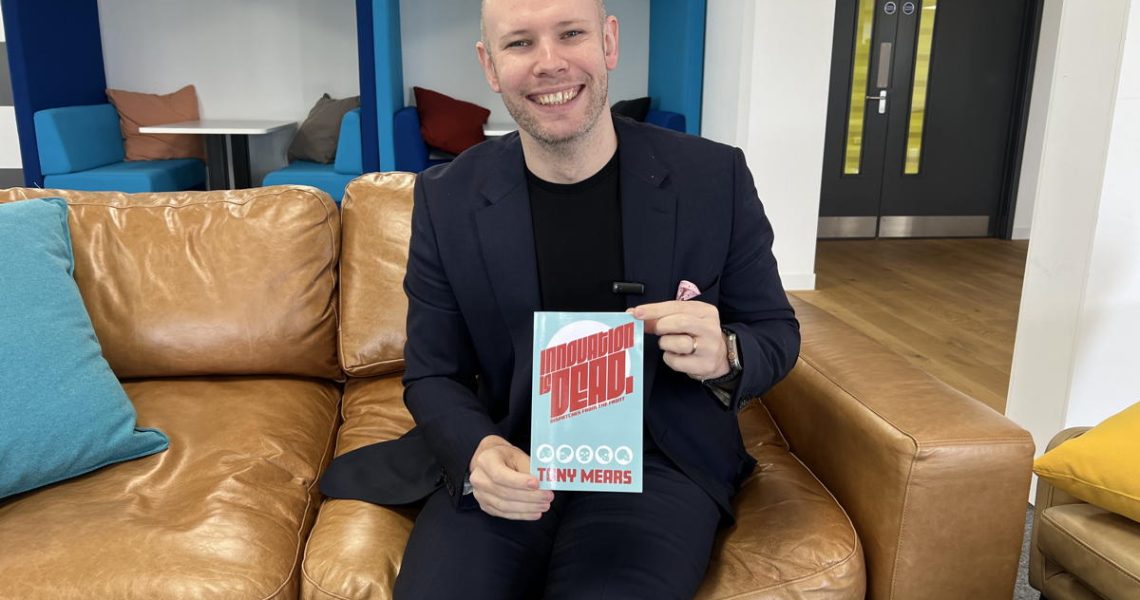Tony Mears – NHS healthcare innovation must look outside
Introduction to Tony Mears
It’s a provocative statement to make, to say that Innovation is Dead. Heck, why not go all the way and make it the title of your book, especially if that is your role.
His found can be found at this website: https://www.innovationisdead.com
Starting off with a degree in archaeology might be a strange starting point compared to his current role as Deputy Director of Strategy at Salisbury NHS Trust Foundation. Then it was a Masters n Political Communications. Sounds like the natural follow-on degree!
His first role in joining the civil service began at the Department for Health before deciding to follow a path in policy. The civil service provides a route to many or any of the government departments and it was the UK Launch Programme in Space Agency.
The next move was to work on the Covid Shielding Programme, which was a step in the direction of health, before ending up at NHS Foundation Trusts in Hampshire and Salisbury.
What makes you say Innovation is Dead?
OK, it may not be dead, but certainly on life support.
There are two parts to the innovation viewpoint: the innovation required in public services; and the public sector fosters innovation out in the private sector. Innovation does happen in pockets but just fails to connect.
Things are happening elsewhere but other sites do not get to hear about it, or even if they did, there would be a lack of resources or skills to adopt. Besides that, there is also the commercial innovation valley of death.
Curiosity
The lack of curiosity can prevent leaders from seeking answers from other places, beyond the healthcare sector. An example could be reaching out to the hospitality sector to understand the customer experience from a booking and flow process.
Adoption
Adopting proving innovation works best with involvement and capability. The places where it succeeds is where root cause analysis involves people experiencing the problem. Adopting is just as hard as innovating.
Snobovators
Best you watch that bit. It starts at 11 minutes 18 seconds in.
Being a Mariana Muzzcato fanboy
Reading her book, Mission Economy, was very compelling and her works centre around how do we deploy innovation and radical change for the betterment of public services.
The approach of risk-share, gain-share should provide a benefit for government if it supports innovation through investment.
Going from National Sickness Service to a Health Service
The triggers for healthcare intervention should be much earlier than they are, and now that is quite expensive. A year ago, physical exercise could have been prescribe but now medication is prescribed.
The integrated care systems has change things slightly. Neighbourhood working helps, that creates multi-disciplinary teams at a local level that know their population and patients, so can intervene earlier. Process innovation has brought the voluntary sector.
A great example of external groups is Silver Salisbury, who are a charity based in South Wiltshire reducing isolation and improving wellbeing. https://www.silversalisbury.co.uk
Digital and Technology will have its role to play with wearable technology and big data working together as one example. This could partly help the population take some responsibility for their own health if they can directly see the risks and the reduction through their own efforts.
Is the NHS in crisis?
Anyone in the NHS if asked this question in the last 30 years will say yes. Politically, there have not been many honest conversations with voters and taxpayers. Population and inflation will do things to the health budget that people will find unpalatable.
Pension age and life expectancy has gone up. We are really good at keeping people alive and for longer. This puts pressure on the state pension system and other organisations.
To face the challenges of the future, we either need more resources to do the same, or must come up with radically different ways of doing things to deliver that care. Hopefully that will come from cross sector innovation. It requires humble leadership to break through and say, we don’t know how so need to look outwards.
Innovation isn’t dead, it’s a case of finding it and spreading it.
